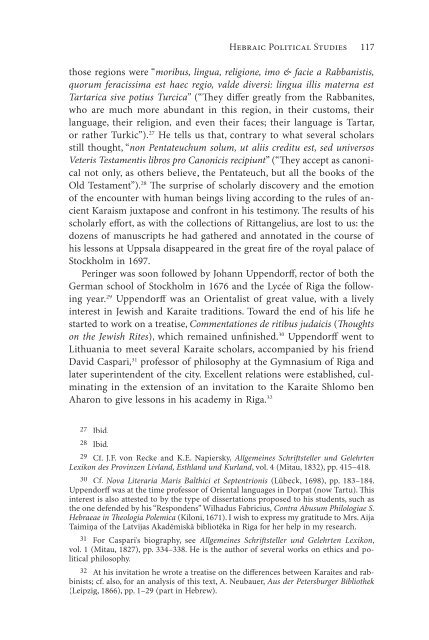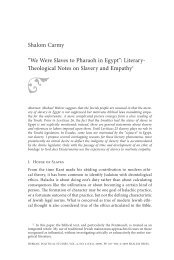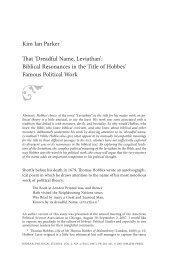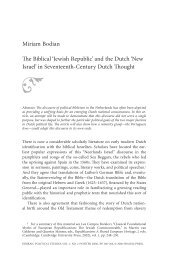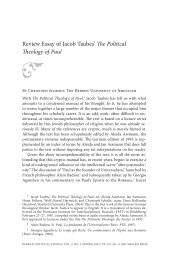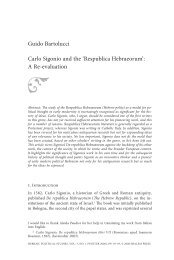download this article in pdf format - Hebraic Political Studies
download this article in pdf format - Hebraic Political Studies
download this article in pdf format - Hebraic Political Studies
You also want an ePaper? Increase the reach of your titles
YUMPU automatically turns print PDFs into web optimized ePapers that Google loves.
HEBRAIC POLITICAL STUDIES 117<br />
those regions were “moribus, l<strong>in</strong>gua, religione, imo & facie a Rabbanistis,<br />
quorum feracissima est haec regio, valde diversi: l<strong>in</strong>gua illis materna est<br />
Tartarica sive potius Turcica” (“ey differ greatly from the Rabbanites,<br />
who are much more abundant <strong>in</strong> <strong>this</strong> region, <strong>in</strong> their customs, their<br />
language, their religion, and even their faces; their language is Tartar,<br />
or rather Turkic”). 27 He tells us that, contrary to what several scholars<br />
still thought, “non Pentateuchum solum, ut aliis creditu est, sed universos<br />
Veteris Testamentis libros pro Canonicis recipiunt” (“ey accept as canoni-<br />
cal not only,<br />
as others believe<br />
, the Pentateuch, but all the books of the<br />
Old Testament”). 28 e surprise of scholarly discovery and the emotion<br />
of the encounter with human be<strong>in</strong>gs liv<strong>in</strong>g accord<strong>in</strong>g to the rules of ancient<br />
Karaism juxtapose and confront <strong>in</strong> his testimony. e results of his<br />
scholarly effort, as with the collections of Rittangelius, are lost to us: the<br />
dozens of manuscripts he had gathered and annotated <strong>in</strong> the course of<br />
his lessons at Uppsala disappeared <strong>in</strong> the great fire of the royal palace of<br />
Stockholm <strong>in</strong> 1697.<br />
Per<strong>in</strong>ger was soon followed by Johann Uppendorff, rector of both<br />
the<br />
German school of Stockholm <strong>in</strong> 1676 and the Lycée of Riga the follow<strong>in</strong>g<br />
year. 29 Uppendorff was an Orientalist of great value, with a lively<br />
<strong>in</strong>terest <strong>in</strong> Jewish and Karaite traditions. Toward the end of his life he<br />
started to work on a treatise, Commentationes de ritibus judaicis (oughts<br />
30<br />
on the Jewish Rites), , which rema<strong>in</strong>ed unf<strong>in</strong>ished.<br />
Uppendorff went to<br />
Lithuania to meet several Karaite scholars, accompanied by his friend<br />
David Caspari, 31 professor of philosophy at the Gymnasium of Riga and<br />
later super<strong>in</strong>tendent of the city. Excellent relations were established, culm<strong>in</strong>at<strong>in</strong>g<br />
<strong>in</strong> the extension of an <strong>in</strong>vitation to the Karaite Shlomo ben<br />
Aharon to give lessons <strong>in</strong> his academy <strong>in</strong> Riga. 32<br />
27 Ibid.<br />
28 Ibid.<br />
29 Cf. J.F. von Recke and K.E. Napiersky, Allgeme<strong>in</strong>es Schristeller und Gelehrten<br />
Lexikon des Prov<strong>in</strong>zen Livland, Esthland und Kurland, vol. 4 (Mitau, 1832), pp. 415–418.<br />
30 Cf. Nova Literaria Maris Balthici et Septentrionis (Lübeck, 1698), pp. 183–184.<br />
Uppendorff was at the time professor of Oriental languages <strong>in</strong> Dorpat (now Tartu). is<br />
<strong>in</strong>terest is also attested to by the type of dissertations proposed to his students, such as<br />
the one defended by his “Respondens” Wilhadus Fabricius, Contra Abusum Philologiae S.<br />
Hebraeae <strong>in</strong> eologia Polemica (Kiloni, 1671). I wish to express my gratitude to Mrs. Aija<br />
Taimiņa of the Latvijas Akadēmiskā bibliotēka <strong>in</strong> Riga for her help <strong>in</strong> my research.<br />
31 For Caspari’s biography, see Allgeme<strong>in</strong>es Schristeller und Gelehrten Lexikon,<br />
vol. 1 (Mitau, 1827), pp. 334–338. He is the author of several works on ethics and political<br />
philosophy.<br />
32 At his <strong>in</strong>vitation he wrote a treatise on the differences between Karaites and rabb<strong>in</strong>ists;<br />
cf. also, for an analysis of <strong>this</strong> text, A. Neubauer, Aus der Petersburger Bibliothek<br />
(Leipzig, 1866), pp. 1–29 (part <strong>in</strong> Hebrew).


